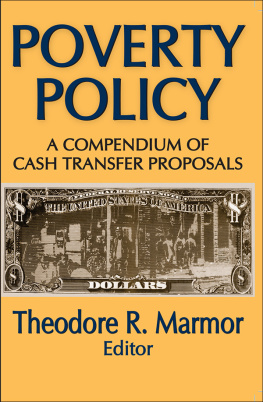First published in 2018 by
Berghahn Books
www.berghahnbooks.com
2018 Jean-Pierre Olivier de Sardan and Emmanuelle Piccoli
All rights reserved. Except for the quotation of short passages for the purposes of criticism and review, no part of this book may be reproduced in any form or by any means, electronic or mechanical, including photocopying, recording, or any information storage and retrieval system now known or to be invented, without written permission of the publisher.
Library of Congress Cataloging-in-Publication Data
Names: Olivier de Sardan, Jean-Pierre, editor. | Piccoli, Emmanuelle, editor.
Title: Cash transfers in context : an anthropological perspective / edited by
Jean-Pierre Olivier de Sardan and Emmanuelle Piccoli.
Description: New York : Berghahn Books, 2018. | Includes bibliographical
references and index.
Identifiers: LCCN 2018008390 (print) | LCCN 2018010084 (ebook) | ISBN
9781785339585 (ebook) | ISBN 9781785339578 (hardback : alk. paper)
Subjects: LCSH: Income maintenance programs--Developing countries. |
Poverty--Developing countries. | Poor--Developing countries. | Economic
development--Social aspects--Developing countries.
Classification: LCC HC59.72.P6 (ebook) | LCC HC59.72.P6 C374 2018 (print) |
DDC 332/.0424091724--dc23
LC record available at https://lccn.loc.gov/2018008390
British Library Cataloguing in Publication Data
A catalogue record for this book is available from the British Library
ISBN 978-1-78533-957-8 hardback
ISBN 978-1-78533-958-5 ebook
Contents
Jean-Pierre Olivier de Sardan and Emmanuelle Piccoli
Jean-Pierre Olivier de Sardan
Alejandro Agudo Sanchz
Gregory Duff Morton
Maria Elisa Balen
Norma Correa Aste, Terry Roopnaraine, and Amy Margolies
Emmanuelle Piccoli and Bronwen Gillespie
Andrs Dapuez and Sabrina Gavigan
Nora Nagels
Fiona Samuels and Nicola Jones
Hania Sholkamy
Magali Chelpi-den Hamer
Jean-Pierre Olivier de Sardan and Oumarou Hamani
Cash Transfers and the Revenge of Contexts
An Introduction
Jean-Pierre Olivier de Sardan and Emmanuelle Piccoli
Cash transfer (CT) programs are having something of a field day. In just over a decade they have become the main form of intervention channeled in the direction of the most vulnerable families in low- and middle-income countries (LMICs). Having originated in Brazil and Mexico in the 1990s, they initially spread to Latin America before being adopted throughout the world from around 2005. Their progression is spectacular: from three countries in 1997, they were implemented in twenty-seven countries by 2007 (Fiszbein et al. 2009) and, by 2016, in 130 countries (Bastagli et al. 2016). In 2016, CTs share of total humanitarian aid exceeded 10 percent (CALP 2018).
A Simple Mechanism with Multiple Forms and Functions
The mechanism that lies at the heart of CTs is very simple (see Olivier de Sardan, ): the basic formula involves the occasional or regular distribution of sums of money to vulnerable households in most cases. This mechanism differs from social security payments (which are contributory), cash for work (in which payments are conditional on the performance of work), and aid in kind (for example, food). CTs also differ from universal cover in that they are targeted at a particular category of the population. They can be either conditional (in most cases subject to the school enrollment of children or completion of medical checkups) or unconditional in nature.
Apart from this common basis, numerous variations can be observed in terms of the norms and procedures governing the payments: some are paid in cash, others by bank transfer, and others, again, in the form of vouchers; they can be one-off, monthly, bimonthly, or trimestrial; they vary considerably in terms of their duration and can be exceptional (cases of emergency in the context of disastrous events), permanent (hence they become a new form of social benefit), or paid over intermediate periods (a number of years, similar to the social security nets that are intended to enable people to emerge from the poverty trap or cope with recurrent food crises); in the majority of cases the recipients are women, but they are sometimes paid to men, and, apart from the main targets of poor or very poor families, the recipients can originate from different social categoriespregnant women, earthquake or famine victims, disabled persons, refugees, demobilized military veterans, etc. Combined with the simplicity of the game or mechanism itself, this flexibility regarding the rules that govern the game is clearly one of the reasons behind the global success of the CT system.
This plasticity also explains the wide diversity that exists in the institutional embedding of CTs: they are sometimes the product of a proactive social policy adopted by the state (as is the case in Latin America and South Africa); they sometimes involve international aid in the form of projects instigated by international institutions (World Bank, ECHO, US-AID, WFP, etc.); and they are often relayed by NGOS (as is the case in Africa, the Middle East, and Asia). In the latter case, the CTs are focused on two main areas: humanitarian aid distributed in the event of food crises or natural disasters, which is usually unconditional, and development aid, which is generally conditional (promotion of resilience to and fight against poverty) and can also assume more atypical forms (disarmament, demobilization, reintegration programs, or DDR [see Chelpi-den Hammer, ]; displacement of populations in case of dam building; settlement of migrants, etc.).
Hence the explicit or implicit socioeconomic functions of CTs are varied and based on the institutional contexts in which they arise and the political-economic frameworks that guide them. Needless to say, they are located in a global economic context dominated by neoliberalism, the financialization of capitalism, and the growth of inequality, and in which no structural solution can be found to the intertwined issues of poverty, marginalization, and exclusion. However, CTs do not constitute a single answer to these problemscontrary to the belief of Ferguson (2015), who interprets CTs solely on the empirical basis of their implementation in South Africa as a new politics of distribution of capitalism and even, more generally, as a sign heralding a new age of capitalism.
On the contrary, CTs are based on multiple agendas. They can represent a provisional response to a cyclical rise in poverty or an attempt to stem its structural growth in the long term; in this case, they can become a new social right. They can have the aim of eradicating extreme poverty or breaking the intergenerational cycle of poverty. They can also set out to integrate marginalized communities into the market and state arena. They can offer a means of increasing school enrollment rates and access to modern healthcare through the mechanism of financial incentives. They can constitute a temporary response to traumatic events and be associated with different forms of reintegration. They can also act as a tool for the empowerment of women. In many cases, they combine several of these objectives.










